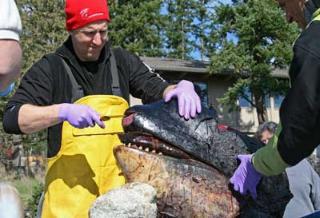By Steve Wehrly
Journal reporter
In a game of chicken on the ocean, Navy vs. Orca might be a one-sided contest.
Despite assurances from federal officials, San Juan Island residents and officials seem skeptical that Navy training exercises adequately protect local whales.
“The people in the San Juans have a special protective feeling about the southern resident orca whales here,” Councilman Howie Rosenfeld told representatives of the Navy at a public meeting in Friday Harbor last week.
Saying the local tourism-based economy is “based on healthy whales,” and that local whales travel all along the Oregon, Washington and even California coasts where Naval exercises take place, Rosenfeld asked, “What chance do the whales have? If there’s a conflict, who’s gonna win?”
The U.S. Navy’s Pacific Fleet environmental program manager, three other managers and a Navy lawyer came to the island on May 1, telling the San Juan County Council and an overflow audience that testing and training in local waters are critical to the mission of the fleet.
Navy officials discussed the scope of the Environmental Impact Statement they must prepare to comply with major U.S. environmental laws, including the Endangered Species Act. The Friday Harbor council wanted to talk about whales, specifically southern resident killer whales that spend their summers along local shores.
Councilwoman Lovel Pratt charged that of 60 local whale deaths documented over the past 15 years, only 35 would be expected from natural causes. During this same time frame, Pratt said, the Navy detonated an estimated 150 bombs in local waters as part of its training exercises.
Council members cited the death of whale L-112, the three year-old female found dead off the Washington coast in February.
Navy spokesman John Mosher, environmental program manager, said the Navy is studying the death but was not engaged in training or using sonar or explosives in the area at the time. But according to reports, two Canadian naval vessels were training in the Strait Juan de Fuca when explosions and sonar “pinging” were heard, a few days before the dead orca was found.
Navy spokesman John Mosher told the council he did not know how many bomb tests have been requested by the Navy over the next few years, but that “nine or 10” are currently permitted as part of training exercises.
Mosher said the Navy is now going through the environmental review process “to support Navy at-sea training and testing activities in the Northwest for the 2015-2020 time frame.” The Navy must secure re-authorization under the ESA by the National Marine Fisheries Service for any Naval activities that may impact local marine wildlife.
Because southern Puget Sound orcas are an endangered species, no killing – accidental or not – is permitted, and non-lethal contacts are severely restricted. The death of even one whale from testing or training could be a major impediment to the Navy’s authorization and permitting process.
Mosher invited the council to submit their suggestions for the scope of the EIS study. After more questions from the council, Chairwoman Miller promised further input to the Navy.



